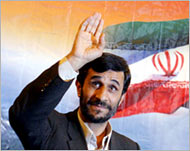Ex-US hostages accuse Iran president
Three Americans held hostage in the 1979 takeover of the US embassy in Tehran have reportedly singled out Iran’s new president-elect as a key player in the abduction.

In interviews with The Washington Times published on Thursday, the former hostages recalled Iran‘s President-elect Mahmoud Ahmadinejad interrogating captives.
“As soon as I saw his picture in the paper, I knew that was the bastard,” retired US Army Colonel Charles Scott, 73, a former hostage, told the newspaper.
“He was one of the top two or three leaders,” said Scott, of Jonesboro, Georgia. “The new president of Iran is a terrorist.”
|
“As soon as I saw his picture in the paper, I knew that was the bastard. The new president of Iran is a terrorist” Charles Scott, retired US Army Colonel and former hostage |
Another former hostage, retired US Navy Captain Donald Sharer remembered Ahmadinejad as “a hardliner, a cruel individual,” the newspaper reported.
“I know he was an interrogator,” said Sharer, 64, of Bedford, Iowa. He told the Times that he was once questioned by Ahmadinejad but did not recall the subject of the interrogation.
Interrogation
Kevin Hermening of Mosinee, Wisconsin, a 20-year-old Marine security guard when the embassy was stormed, told the paper that he had contact with Ahmadinejad right after the takeover.
“He was involved in interrogating me the day we were taken captive,” Hermening was quoted as saying. He said interrogators sought the combinations for “safes and other things that were locked”.
 |
|
Ahmadinejad was just 23 at the |
Not everyone agrees. Former hostage and retired US Air Force Colonel Thomas Schaefer said he does not recognise Ahmadinejad, by face or name, as one of his captors.
Several former students among the hostage-takers also said Ahmadinejad did not participate. And a close aide to Ahmadinejad denied the president-elect took part in the seizure of the embassy or in holding Americans hostage.
Students seized the US embassy in Tehran on 4 November 1979, and held 52 Americans hostage for 444 days to protest Washington‘s refusal to hand over the US-backed Shah Mohammad Reza Pahlavi for trial.
The shah fled Iran earlier that year after he was overthrown by the Islamic Revolution.
Denial
Ahmadinejad, who won Iran‘s presidential election by a landslide last week, was a 23-year-old university student at the time of the takeover in November 1979 and was a founding member of the student group that organised the storming of the US embassy compound, the Times said.
Ahmadinejad‘s aide, Meisan Rowhani, said from Tehran that Ahmadinejad was asked during recent private meetings if he had a role in the hostage taking. Rowhani said he replied: “No. I believed that if we do that the world will swallow us.”
Memories
Another former hostage, Paul Lewis, said he thought Ahmadinejad looked vaguely familiar when he saw a picture of him on the news last week, but the former marine embassy guard said he could not be certain.
|
“My memories were more of the gun barrel, not the people behind it” Paul Lewis, |
“My memories were more of the gun barrel, not the people behind it,” said Lewis, who lives in the central Illinois town of Sidney.
A memory expert cautioned that people who discuss their recollections can influence one another in reinforcing false memories. Also, it is harder to identify from memory someone of a different race or ethnicity, said psychologist Elizabeth Loftus of the University of California, Irvine.
“Twenty-five years is an awfully long time,” Loftus said. “Of course we can’t say this is false, but these things can lead people down the path of having a false memory.”